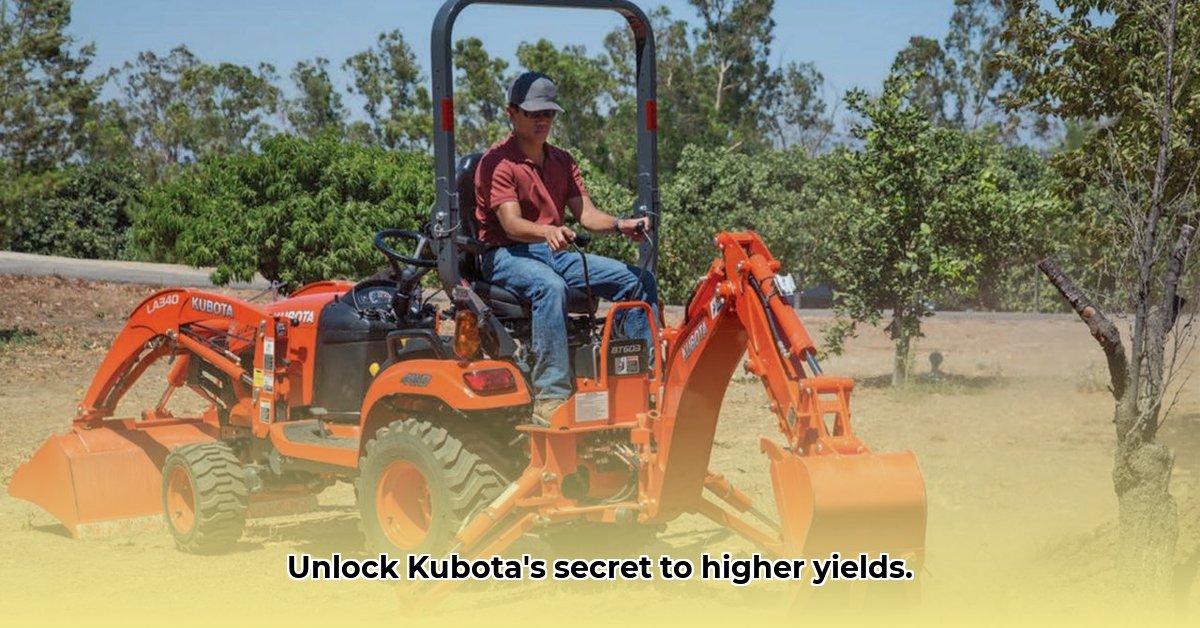
Sustainable agriculture is no longer a niche pursuit; it's the future of food production. Meeting the growing global demand for food while minimizing environmental impact requires innovative solutions, and precision agriculture, powered by tools like Kubota's compact tractors, is leading the charge. This article explores how these tractors are transforming sustainable farming practices, boosting yields, and enhancing environmental stewardship. Learn more about Kubota's small tractors here.
Kubota Tractors: A Foundation for Sustainable Practices
The challenge of feeding a growing population while preserving our planet’s resources is immense. But advancements in agricultural technology offer a path forward. Kubota's small tractors provide a crucial component: reliable, efficient machinery perfectly suited for implementing precision agriculture techniques on farms of all sizes. Their maneuverability and adaptability make them ideal for integrating with GPS-guided systems, variable-rate technology (VRT), and other precision tools, maximizing efficiency and minimizing waste. This allows farmers to optimize resource use, boosting yields while lightening their environmental footprint. Could your farm benefit from this precision approach?
Precision Agriculture: Doing More with Less
Precision agriculture is all about farming smarter, not harder. It's the art of using technology to optimize resource allocation, ensuring that inputs like fertilizers, pesticides, and water are applied only where and when they are needed. This pinpoint accuracy minimizes waste, reduces environmental impact, and ultimately, boosts yields. Imagine accurately planting seeds, only where the soil conditions are optimal, minimizing wasted seeds and maximizing germination rates. This level of control isn't just theoretical; it's becoming a reality for farmers utilizing Kubota tractors and precision farming techniques.
The Power of GPS Guidance and Variable-Rate Technology
GPS-guided Kubota tractors enable incredibly precise planting and spraying operations. No more overlapping passes or uneven application – resources are used efficiently, minimizing waste and maximizing effectiveness. Coupled with VRT, farmers can adjust the amount of fertilizer or pesticide delivered based on the specific needs of each section of the field. This tailored approach ensures plants get precisely what they need, maximizing growth while minimizing potential harm to the environment. “Using VRT with my Kubota tractor has drastically reduced my fertilizer use by 18%, without impacting yield,” says John Miller, a successful Iowa farmer.
Soil Health and Water Conservation: Key Sustainable Practices
A healthy soil is the backbone of sustainable agriculture. Kubota tractors, equipped with no-till attachments, minimize soil disturbance, promoting healthy soil structure, improving water infiltration, and reducing erosion. “No-till farming, facilitated by my Kubota, has significantly improved my soil health – I’m seeing better water retention and less soil erosion,” shares Sarah Chen, a California farmer. Similarly, GPS-guided irrigation systems, perfectly integrated with Kubota tractors, ensure water reaches only where it’s needed, dramatically reducing water waste – a critical aspect of sustainable farming, especially in water-stressed regions.
Real-World Success: Farmers Embracing the Future
The benefits of this combined approach aren’t merely theoretical; farmers are already reaping significant rewards. John Miller from Iowa, employing a Kubota tractor with GPS guidance and VRT for fertilizer application, reports an impressive 18% reduction in fertilizer use without a corresponding decrease in yield. Meanwhile, Sarah Chen in California utilizes her Kubota for precision planting and irrigation, achieving a 15% increase in yield while significantly reducing water consumption. These are not isolated instances; they represent a growing global shift towards sustainable and technologically advanced farming practices.
Overcoming Challenges, Seizing Opportunities
While the advantages of precision agriculture are undeniable, several challenges exist. The initial investment in equipment and technology can be substantial. Furthermore, farmers need training and support to effectively utilize the new technology and manage the resulting data. However, many solutions exist. Government subsidies and grants can ease the financial burden. User-friendly software and readily available training programs are addressing the learning curve. “Government assistance was vital in allowing me to upgrade to a GPS-guided Kubota,” comments Miller. These initiatives are making precision agriculture accessible to more farmers.
The Future of Sustainable Farming: Technology and Tradition
The convergence of advanced technology and sustainable farming practices is shaping a future of agriculture where higher yields and environmental stewardship go hand-in-hand. Kubota tractors, with their adaptability and reliability, act as a bridge between established practices and cutting-edge technology, enabling farmers to optimize their operations and enhance their sustainability efforts. The potential is immense: increased profitability, reduced environmental impact, and a more resilient and sustainable food system for generations to come. The question isn't whether this future will arrive, but how quickly we embrace it.